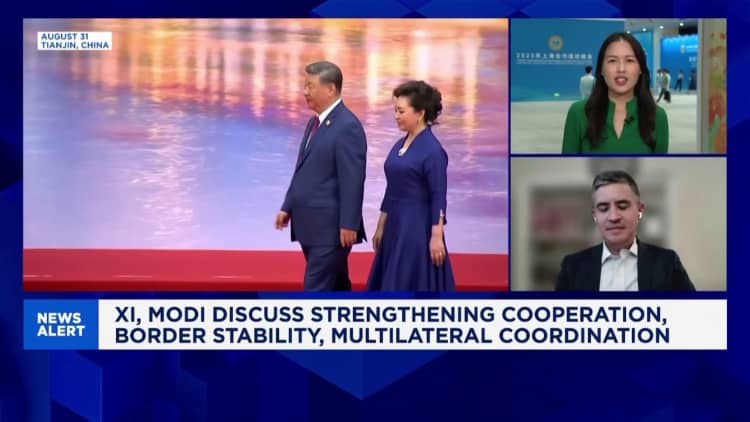U.S. Treasury Secretary Scott Bessent arrives to meet Spain’s Foreign Minister Jose Manuel Albares, to continue discussions on trade, economic and national security issues, in Madrid on Sept. 14, 2025.
Ana Beltran | Reuters
U.S. and Chinese trade negotiations have stretched into a second day in Spain, with an agenda of several sticking points ranging from tariff rates, export controls and an imminent deadline for a divestment of Chinese-owned social media TikTok.
A first day of negotiations — led by Treasury Secretary Scott Bessent and Trade Representative Jamieson Greer on the U.S. side, and by Chinese Vice Premier He Lifeng and by top trade negotiator Li Chenggang for China — focused on TikTok, tariffs and the economy, according to a U.S. official.
The latest talks in Madrid mark the fourth round of bilateral meetings in four months, after both sides reached an agreement in May to pause most of the steep tariffs and walk back some of their mutual restrictions. A trip to Washington by Chinese senior trade negotiator Li Chenggang last month yielded little progress.
As the parties head into the second day of talks, Bessent said they made good progress on technical details and are close to reaching an agreement on TikTok.
“Our Chinese counterparts have come with a very aggressive ask,” he said, according to Reuters. “We will see if we can get there at present. We are not willing to sacrifice national security for a social media app.”
Tensions have ramped up in recent days. Over the weekend, China launched two investigations targeting the U.S. semiconductor industry, including an anti-dumping probe relating to certain American-made analog IC chips, along with an anti-discrimination investigation into U.S. moves against the Chinese chip sector.
The investigations were kicked off after the U.S. added 23 more China-based companies to its entity list last Friday.
On Monday, China’s market regulator said that a preliminary investigation found Nvidia was in violation of the country’s anti-competition laws, adding that a further probe into the U.S. chip giant will be carried out.
Nvidia has become “a leverage for both sides,” with the extended probe as “clearly part of negotiation tactics run by Beijing to show its tough side to Washington,” said George Chen, partner of digital practice at business advisory The Asia Group.
These trading barbs exchanged ahead of the Madrid rapprochement were “not encouraging,” said Wendy Cutler, a former U.S. trade representative and head of the Asia Society Policy Institute in Washington, adding that “China is going to drive a hard bargain” in U.S. President Donald Trump’s second mandate and likely demand some compensation in exchange for lifting these new measures.
Cutler pointed out that Beijing had managed to get Washington to remove certain controls on exports of tech equipment to China, after it tightened exports of critical minerals and magnets to the U.S.
“With this approach, [it’s] hard to see how the bilateral economic relationship improves. More like running to [a] stand-still,” Cutler said.
Separately, China’s ministry of commerce in a statement pushed back against Trump’s request for the European Union to impose secondary tariffs of up to 100% on China over the country’s purchases of Russian oil.
This was “a classic act of unilateral bullying and economic coercion” and “a severe violation of the consensus reached” during a call between Trump and Xi earlier this year, a spokesperson for the ministry said in the statement, vowing to take “any necessary measure” to defend Beijing’s legitimate interests.

Officials are also expected to discuss details of a potential meeting between Trump and his Chinese counterpart Xi Jinping later this year. The Wall Street Journal reported Sunday that Beijing has for the past two months sought to broker a Trump visit to China, what would be the U.S. president’s first state visit to the country after a trip in 2017.
The chance for a potential Xi-Trump meeting will depend on the results of Madrid talk, in particular the fate of TikTok, The Asia Group’s Chen said, warning that temperature could rise further if Beijing finds Washington “disrespectful” as it seeks to manage the perception of its relations with the U.S. at home.
Beijing-headquartered ByteDance faces a Wednesday deadline to reach a deal to continue operations in the U.S. Trump has extended similar deadlines three times this year with Beijing and Washington seeking controls of the app’s recommendation algorithm.
China, which must approve any sale, has put the technology on an export-control list and so far offered little indication of its willingness to allow such a transfer to an American owner.
Trump told reporters later on Sunday that the talks were “going fine” and that TikTok’s fate will depend on Beijing’s actions.
With TikTok being a useful bargain for Trump to win over American young voters, Beijing may be “more than happy to satisfy Trump’s terms on TikTok if that is a must [for the] reduction of U.S. tariff by 10% or more,” said Neo Wang, lead China strategist at Evercore ISI.
— CNBC’s Evelyn Cheng contributed to the report.
Breaking News: Economy,Politics,Breaking News: Politics,NVIDIA Corp,Asia Economy,Economy,business news
#Nvidia #probe #TikTok #deadline #loom #U.S.China #trade #talks
